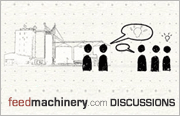Natural calamities are pushing domestic feed grains stocks lower, forcing Europe to increase imports. Europe is facing weather extremities in literally all regions, according to Chris Corry, U.S. Grains Council director of international operations.
“In Western Europe, farmers are encountering flooding and in the eastern areas they are being hit with extreme drought conditions,” he said. “This is coupled with the fact that Europe has depleted their interventions stocks, most of which was wheat and barley.”
He added that Europe had minimal feed grains in storage due to a poor harvest last year, also a result of weather. Given the current market situation, Corry said Europe has turned to U.S. sorghum as a reliable feed source for the livestock sector. Just within the last three weeks, 25.4 million bushels (646,000 metric tons) of U.S. sorghum has been traded to Europe. The largest buyer is France.
“Since the first of the month, France has purchased an astounding 3.25 million bushels (82,500 tons) of sorghum,” said Corry, adding that Ireland, Italy, Netherlands and Spain were also purchasers. “Spain importing 14.8 million bushels (376,500 tons) is not as surprising as they have been a reliable trading partner of U.S sorghum for quite sometime.”
He said that USGC consultants will be in Europe assessing the market situation and the extent of the crop damages and identifying opportunities and constraints. Early reports suggest France may need up to 1 million metric tons of corn and sorghum and is looking to source these grains from the United Stated, Brazil and Argentina. However, Brazil and Argentina will not harvest the current corn crop until April, leaving U.S. sorghum as the most likely source, due to biotechnology restraints. Gretchen Flanley, USGC director of biotechnology programs, said the tight supplies and high feed costs in the European Union have led the agricultural industry to call for a faster regulatory process.
“Although Europe does use a scientifically-based safety assessment of these products, undue delays in the regulatory procedures as well as the political process hamper the approval of biotech events for feed imports,” she said.


